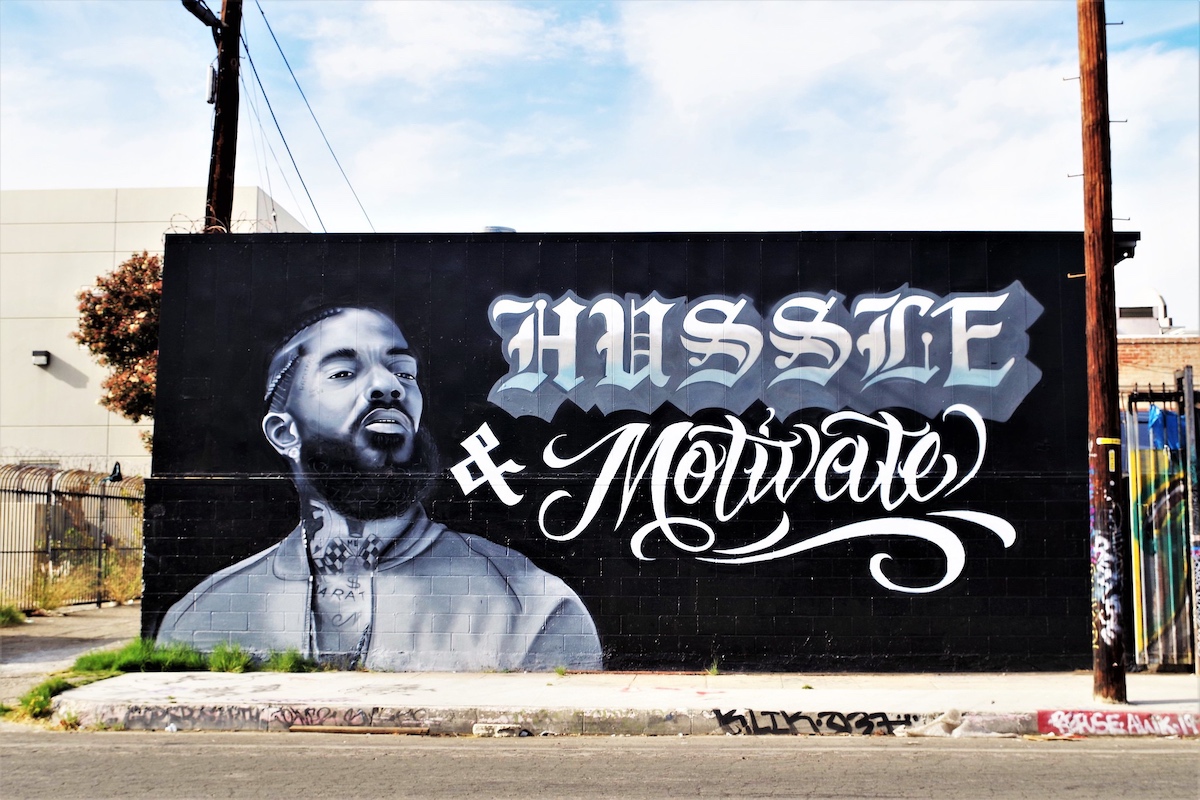Los Angeles rapper Nipsey Hussle’s untimely death on March 31, 2019 sent shockwaves through the music world. But his work as an entrepreneur and forward-thinking philanthropist is what has continued to define his legacy for many fans and professionals, including in the Philadelphia area.
In November 2013, Hussle received national attention when he sold out of 1,000 copies of his “Crenshaw” mixtape at $100 each at a 24-hour pop-up shop in Los Angeles. Music mogul Jay-Z purchased 100 copies alone. Hussle’s desire to achieve results as a businessman were matched by his passion for giving back to his community which took on forms like advocacy for STEM education among Black youth.
REC Philly cofounder Will Toms was a student of Hussle’s entrepreneurship. He identified with seeing another Black man from a similar background talk about success as a marathon, and using business as a tool to reach new benchmarks and support other people like him.
“When you’re coming up as a young person, you see Beyoncé and Diddy [on one end] and the other representation is the starving artist that you know. Nipsey was living proof that there is a middle ground. He was building something real that can go on forever. He was emblematic of that middle road and used that platform to diversify. That’s what a young creative should identify with and do that in a way where you can keep your integrity.”
Toms valued Hussle’s mindset of a systems thinker and his use of vertical integration to accomplish goals; vertical integration occurs when a single company owns multiple stages of production. As an independent artist, Hussle focused on how he could press and distribute his own music rather than wait on the music industry and market to respond to it. He later used the same methodology with his Marathon Clothing business. Today, REC Philly works to provide artists with one central location where they can produce music, have photo shoots, and sell and produce merchandise.
“It wasn’t just about the one touchpoint of the music,” he said. “If I was a business owner, how do I think about making my own merchandise? At first it was get the t-shirt and putting my picture on it. But then it becomes saving money by owning the t-shirt store. This builds ownership. It helps to build with an example. As you find success, your role is not to just be the mouthpiece. When you understand, then you don’t need to make a million t-shirts. With the t-shirt and vertical integration, it’s getting the manufacturing relationship and then becoming the retailer.”

As a writer and project manager working in the music business, Ashley Coleman Thomas appreciated how Hussle was able to solidify the idea of the working music professional. Every artist may not achieve the heights of a Beyoncé or Diddy, but by following Hussle’s model, she agreed with Toms that they could still have a viable career in their own right by focusing on their supporters and working from there. Hussle’s philanthropy inspired her and the work she does with Permission To Write, an online community for emerging writers that she leads.
“Nipsey had his own career and clothing label, but then him also launching the tech workspace that was helping kids from the Crenshaw neighborhood learning about STEM,” she said. “That was investing in his community in the way of giving folks the steps and tools to move forward in a skill economy. This helped kids from disadvantaged neighborhoods.”
As an author that has self-published her own books before signing a book deal with a major publisher, Thomas also found the work that Hussle did as an artist to be a cogent case study in how to build leverage as a creator toward a better deal. Rather than be content with signing a record deal with a major record label, Hussle focused on releasing his music independently for years before reaching a strategic deal with Atlantic Records in 2017
“You can dictate your value,” she said. “It’s the idea of creating leverage. We see it with Nipsey and also saw with Jay-Z that a lot of times you’re knocking on doors that are closed and aren’t opening for you. We live in a time where we don’t have to rely as heavily on gatekeepers. We have an opportunity to go to direct to customers. I always wanted to write books but had no idea how to do that. But writing a blog for years, I had a following. There’s a lot that comes with managing a product, your own business and getting things to a certain point where you can leverage that to your advantage. You create leverage in the negotiation process and come with wealth of knowledge to help create products.”

Ashley Coleman Thomas. (Photo via LinkedIn)
Taste Creators founder Brianna DeMayo was also fascinated with how Hussle used leverage to his advantage. As someone that frequently works with independent musicians to explore the best possible options available to them, she developed a high level of respect for his DIY mentality.
“You could think of [leverage] like your credit score,” she said. “The higher your credit score, the more things you can get. In a music sense, the more you can do on your own independently, the less anyone can take from you. That’s why you can go and get a partnership deal. It’s so aligned with what I teach artists. Put up your merch store and have your own community events. If you wait for a label to do it, they’ll take the bulk of the earnings.”
Media coordinator and Camden native Adrian Poitier said that community development came to mind when he thought about the work that Hussle did in Crenshaw, California. Before his passing, Hussle worked with his business partner David A. Gross to fight gentrification by building community centers and supporting STEM education among young adults.
“Learning more about Nipsey made me look into who he was as a person,” he said. “I found out more about his Crenshaw community and it made me want to do more in Camden. I did research on his life and learned about his process of giving back. David A. Gross is still building out community centers for Black creatives and the STEM community.”
For entrepreneurs of all backgrounds, Hussle worked with a zeal and knew that results did not come via instant gratification, but with time and directed effort, they would come. As he would say: “The marathon continues.”
_
Today at 2 p.m., reporter Michael Butler will chat live with REC Philly’s Will Toms about Nipsey Hussle’s legacy, the impact of the late entrepreneur and musician on his work, and lessons to learn from Hussle’s innovative business practices. Tune in on Instagram Live.
Michael Butler is a 2020-2022 corps member for Report for America, an initiative of The Groundtruth Project that pairs young journalists with local newsrooms. This position is supported by the Lenfest Institute for Journalism.WEDNESDAY: On the anniversary of musician + entrepreneur Nipsey Hussle's passing, @recphilly_'s @TheWillToms will chat with reporter @mikeviimusic on Instagram Live about lessons to learn from Hussle's innovative business practices.
Join us on 3/31 @ 2pm: https://t.co/cQ0shXgoOz pic.twitter.com/AlZc4areeo
— Technical.ly (@Technical_ly) March 30, 2021
Join our growing Slack community
Join 5,000 tech professionals and entrepreneurs in our community Slack today!
Donate to the Journalism Fund
Your support powers our independent journalism. Unlike most business-media outlets, we don’t have a paywall. Instead, we count on your personal and organizational contributions.





